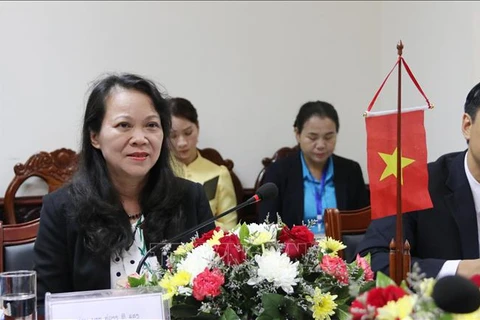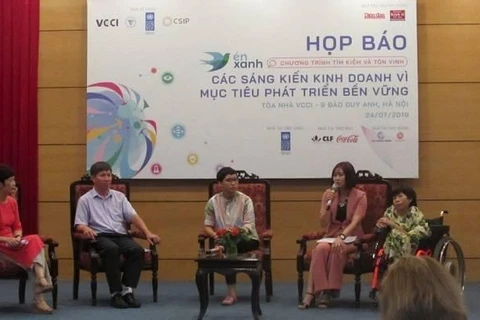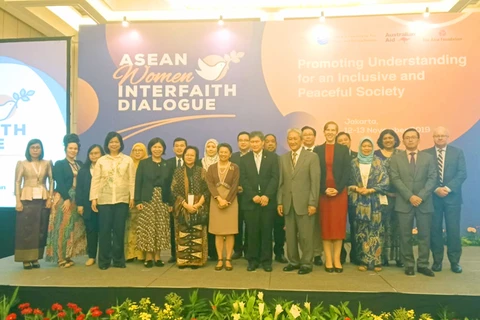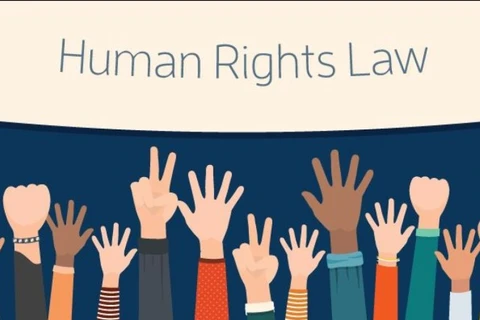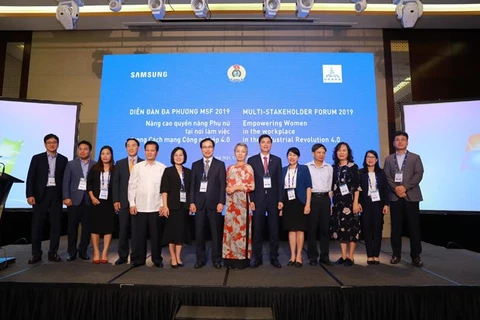 One of the booths showcasing products by women of the Dao ethnic group supported by the GREAT programme (Photo: VietnamPlus)
One of the booths showcasing products by women of the Dao ethnic group supported by the GREAT programme (Photo: VietnamPlus) Hanoi (VNA) - With the support from 45 partners belonging to various fields, the Gender-Responsive Equitable Agriculture and Tourism (GREAT) programme is hoped to help about 40,000 women to raise income and generate 4,000 jobs suitable for ethnic women, in a bid to bolster economic development in Vietnamese localities.
An event within the framework of the programme entitled “From Village to Markets: Empowering Ethnic Minority Women” was held in Hanoi on December 6. It was designated to report on initial results of the activities on economic empowerment of women.
The GREAT programme is under the sponsorship of the Australian government, with a budget of 33.7 million AUD (23.64 million USD). It is striving to empower women to better engage in agriculture and tourism markets, and enhance women’s voices in decision-making. The programme is focusing on ethnic women in the northern mountainous provinces of Lao Cai and Son La.
With the help from 45 partners belonging to various fields, the programme is hoped to assist about 40,000 women to raise income and create 4,000 jobs suitable for ethnic women, in a bid to bolster economic development in Vietnamese provinces.
During the past 12 months, the GREAT programme has reaped significant results, evidenced by the fact that up to 11,000 women gain skills and knowledge on agriculture, processing, tourism and business operation.
Under the programme, a number of innovative activities have been carried out, helping local people access new crop varieties while local cooperatives could connect with major retailers like the Big C supermarket chain.
The “From Village to Markets: Empowering Ethnic Minority Women” event offered a chance for ethnic groups participating in the GREAT programme to popularize their products at the pavilions.
At the event, 14 GREAT partners showcased their products and services through a marketplace featuring tea, vegetables, spices, medicinal plants, fruits, flowers and community-based tourism. There was also an opportunity to taste the local flavours of Son La and Lao Cai with a delicious three-course menu sourced from ingredients from GREAT partners.
In addition, a seminar was arranged on the sidelines of the event, during which participants discussed different aspects of main challenges and solutions for ethnic women to profitably engage in agriculture and tourism markets.
Businesses also put forward measures to help the private sector foster the links between women and domestic and international markets, as well as necessary intervention by local authorities.
Visiting booths, Australian Ambassador to Vietnam Robyn Mudie affirmed that her country is expanding its commitment to Vietnam on women empowerment and gender equality, adding that women play an important role for Vietnam’s further success and economic growth in the coming time.
The diplomat said she was impressed by various products presented at the event, particularly herbal ones targeting domestic market, which are part of the global supply chain.
This illustrated opportunities and potential in the northwestern region of Vietnam in economic empowerment for women in agriculture and tourism.
The partners showcasing their products showed dynamism and business capacity of the people in Vietnam, serving as an inspiration for female leaders that the GREAT programme could help prove its effectiveness, she added.
The GREAT Programme is a flagship of Australia’s Department of Foreign Affairs and Trade’s Aus4Equality portfolio. It is scheduled to run until 31 December 2021. The People’s Committees of Son La and Lao Cai provinces are the programme’s key counterparts.
The programme is working with business, NGO and government partners to build more inclusive business and market systems within the agriculture and tourism sectors in Son La and Lao Cai provinces. By ensuring that businesses, and the wider market systems within which they operate, engage with and benefit women and ethnic minorities, more people can participate in and benefit from related economic activities and growth.
It also advocates for and educates on gender equality, working directly with businesses, the Government and NGOs to influence policies, attitudes and practice./.

